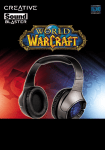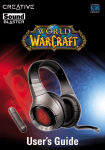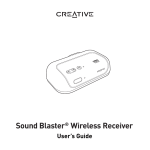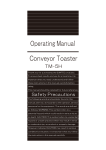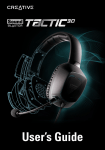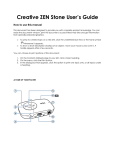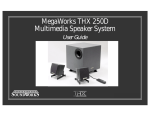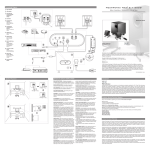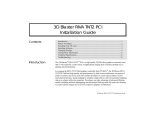Download Creative BLASTER TRANSMITTER User`s guide
Transcript
Sound Blaster Wireless Headphones User’s Guide Congratulations! Your Sound Blaster® Wireless Headphones works with Sound Blaster Wireless transmitters like Sound Blaster X-Fi™ Notebook and Sound Blaster Wireless for iTunes®. Together, your transmitter and headphones enable you to enjoy your favorite music, wherever you are in your home, wirelessly. For a list of supported devices, visit www.soundblaster.com. About Your Headphones R 1 2 3 Power switch / LED Audio Line In jack USB connector 5 4 6 5 Connect button / Link LED Previous / Rewind button * (for charging only) + US B OFF _ 7 8 ON Press and hold to rewind. 6 Next / Fast Forward button * 7 8 Play / Pause button * Volume buttons 1 2 3 Press and hold to fast forward. 4 * Function is available with the transmitter software installed and applicable to these media players: iTunes®, Windows® Media Player and Creative Music Server. Getting Started 2 Getting Started Step 1: Charge your headphones For first use, charge the headphones for at least 12 hours. Turn off the headphones while charging. The Power LED lights up red when charging, and turns off when fully charged. OFF ON 3 2 4 12 hrs 1 1 2 3 4 USB connector DC-to-USB cable Power adapter Power outlet IMPORTANT Use only the charger supplied with your headphones. Step 2: Enable your transmitter Ensure that your Sound Blaster Wireless transmitter (available separately) is turned on and its wireless control is enabled. Refer to your transmitter’s user documentation to do this. Turn on headphones and Auto pair 3 Step 3: Turn on headphones and Auto pair Turn on your headphones. If you have two or more headphones, simply turn on all of them. Your transmitter and headphones should pair automatically. The Link LED flashes and then lights up green when pairing is successful. OFF ON US B NOTE • If your transmitter and heaphones do not pair, simply reset them. On one unit at a time, press and hold the Connect button for five seconds. The LED flashes twice to indicate that the headphones has been reset. • Signal quality between the transmitter and headphones may be affected by any object or structure (for example, multiple walls) that is between the units. Experiment with different positions if necessary. Play and stream music 4 Step 4: Play and stream music Once paired, you can use your headphones up to 30 meters away from your transmitter. Play music from your transmitter to check that the headphones is receiving the music wirelessly. <30 metres CAUTION Adjust headphones volume to a comfortable level. Do not listen to audio on your headphones at high volumes for prolonged periods of time as hearing loss might result. Wearing the headphones Adjust the headband so that the headphones rests lightly on your head. Do not tighten excessively. About Broadcasting and Zone Control 5 About Broadcasting and Zone Control Control your headphones remotely from your transmitter, using the Broadcast and Zone Control buttons found on your transmitter’s software. For more information on using these features, refer to your transmitter’s documentation. Broadcasting R R R T R T Transmitter R Receiver Use Broadcast mode to stream music to all your receivers* simultaneously. This mode can be used with or without manual pairing and enables you to quickly set up and use your wireless music system - perfect for occasions such as parties when you want everyone to listen to the same music throughout your home. Zone Control R1 R4 R2 T R3 Use Zone control if you wish to stream the same song to selected receivers* only. This mode requires you to do manual pairing. If your transmitter is capable of transmitting multiple^ playback streams, you can stream different songs to different receivers. NOTE * Refers to the Sound Blaster Wireless Headphones, as well as other supported Sound Blaster Wireless receivers and speakers. ^ For news and updates on the availability of our multi-stream transmitter, the Sound Blaster Wireless MultiPlay, as well as other Sound Blaster Wireless devices, visit www.soundblaster.com. Manual Pairing 6 Manual Pairing This section shows you how to pair your transmitter and headphones manually. TIP For more effective pairing, bring the headphones close to the transmitter when pairing the devices. Once paired, you can use the headphones at another location in the house. Step 1: Press the Connect button on your transmitter Press the Connect button on your transmitter’s hardware or software. The transmitter’s Link LED flashes. CONNECT NOTE Your transmitter may differ in appearance from the one shown here. Press the Connect button on your first headphones 7 Step 2: Press the Connect button on your first headphones This must be done within three minutes after pressing the Connect button on the transmitter (Step 1). Once the transmitter and headphones are paired successfully, the Link LED on both units light up green and remain on. The first receiver to be paired will be assigned to Zone 1. US B NOTE If your transmitter and heaphones do not pair, simply reset them. On one unit at a time, press and hold the Connect button for five seconds. Perform the following steps to pair additional headphones: Step 3: Press the Connect button on your transmitter again The transmitter’s Link LED flashes. Step 4: Press the Connect button on your second headphones Once the transmitter and the second headphones are paired successfully, the Link LEDs on both units light up green and remain on. Repeat the steps to pair your third and fourth headphones (if applicable) manually. Using Your Headphones 8 Using Your Headphones Adjusting volume Press the Volume Up or Down buttons on your headphones. Charging your headphones After initial charging, your headphones take approximately three (3) hours to be fully charged using the supplied charger. You can continue to use the headphones while it is charging. Using Wireless Off mode Your headphones can be used as normal wired heaphones. When you connect an external audio source to the Audio Line In jack, the headphones’ wireless features will be disabled. 1 2 Audio Line In jack Audio cable 3 CD player, MP3 player or other external audio sources. Link LED (available separately) 1 USB 4 US B Turns off when an external source is connected to the Audio Line In jack. 2 4 3 Using Your Headphones 9 Understanding the Power LED Power switch ON OFF Charger connected LED color & behavior No / Yes ON ● Blue - Flashing (beep every min) No OFF OFF ON Blue - Stable ❊ ❊ Red - Flashing No Status Turned on and ready for use Battery low On standby mode (turned off remotely by transmitter) No ❍ Not lit Battery flat / Audio Line In detected No ❍ Not lit Turned off Yes ❍ Not lit Fully charged Yes ● Red - Stable Charging Understanding the Link LED LED Green Not lit Behavior ● Stable ❊ Flashing – Status Paired (Turned on) Pairing in progress Connection lost / Wireless Off mode Removing the battery before disposal 10 Removing the battery before disposal You can protect the environment by removing and recyling the battery before disposing the headphones. Removing the rechargeable battery will damage the headphones permanently. Make sure the headphones is disconnected from the power adapter before you do the following: 1 Pull off the right ear cushion to remove it. 2 Use a small screwdriver to remove the four screws that hold the speaker plate in place. 3 Remove the PCB panel and cut all wires attached to it. 4 Remove the battery which is affixed to the PCB panel. 1 2 3 4 Troubleshooting 11 Troubleshooting There is no sound from my headphones. Check the following: • Make sure your transmitter is turned on and its wireless control is enabled. • Make sure the headphones is turned on and is sufficiently charged. • Make sure the Link/Connect LEDs are green, and your units are paired. The Link LEDs do not light up. This indicates that the headphones has lost its connection with the transmitter. Try the following: • Reset the wireless connection. Press and hold the headphones’ Connect button for five seconds. • Reposition your transmitter or headphones so that there are fewer objects (for example, multiple walls or large metal structures) between them. • Make sure your transmitter is not placed on a metal surface. • Move your transmitter and headphones closer to each other. I have two Creative transmitters. My receiver is receiving the incorrect transmission. Your headphones may be alternating transmissions between the transmitters. Manually pair your headphones. See “Manual Pairing” on page 6. Troubleshooting 12 My headphones seems to be picking up extra noise, or there are intermittent pauses. The position of your headphones as well as the signals from other wireless routers or Bluetooth equipment may affect the quality of the transmission. Try the following: • In the Wireless Music Control section of your transmitter software, change the RF Channel from Auto to either Ch 1, 2 or 3. • Move your transmitter and headphones closer to each other. For best performance, your transmitter and headphones should be operating on the same floor. • Move your transmitter or headphones away from other devices that transmit wireless signals. The headphones may also pick up noise from nearby power supply equipment. • Reposition your transmitter or headphones so that there are fewer objects (for example, multiple walls or large metal structures) between them. • If you have two or more Sound Blaster Wireless transmitters transmitting simultaneously, ensure that they are placed at least five meters apart to prevent inteference. • Set your wireless LAN router's channel to Auto, 1 or 11. To do this, refer to your router's user documentation. • Refrain from doing large file transfers via the wireless internet or Bluetooth connection while you are streaming music. Alternatively, stop streaming music during intensive file transfers. General Specifications 13 General Specifications Connectivity • One 3.5 mm (1/8”) stereo jack for Analog Line In • One mini USB connector for charging Power Adapter • Supply Voltage: 5V +/- 5% • Current: 1 A • Power: 5 W Radio Frequency (RF) • Operating RF range: 2400 - 2483.5 MHz • Number of RF channels: 3 • RF transmitter power output: 16 dBm (typical) NOTE You cannot tune the RF channels. Safety Information 14 Safety Information Refer to the following information to use your product safely, and to reduce the chance of electric shock, short-circuiting, damage, fire, hearing impairment or other hazards. Improper handling may void the warranty for your product. For more information, read the warranty available with your product. • Read these instructions. • Keep these instructions. • Heed all warnings. • Follow all instructions. • Do not use this apparatus near water. • Clean only with dry cloth. • Do not block any ventilation openings. Install the product in accordance with the instructions. • Do not install near heat sources such as radiators, heat registers, stoves, or other apparatus (including amplifiers) that produce heat. • Do not expose your product to temperatures outside the range of 0°C to 40°C (32°F to 104°F). • Do not pierce, crush or set fire to your product. • Keep your product away from strong magnetic objects. • Do not subject your product to excessive force or impact. • Do not defeat the purpose of the polarized or grounding-type plug. A polarized plug has two blades with one wider than the other. A grounding type plug has two blades and a third grounding prong. The wide blade or the third prong are provided for your safety. If the provided plug does not fit into your outlet, consult an electrician for replacement of the obsolete outlet. • Protect the power cord from being walked on or pinched particularly at plugs, convenience receptacles, and the point where they exit from the apparatus. • Only use attachments/accessories specified by the manufacturer. • Use only with the cart, stand, tripod, bracket or table specified by the manufacturer, or sold with the apparatus. When a cart is used, use caution when moving the cart/apparatus combination to avoid injury from tip-over. • Unplug this apparatus during lightning storms or when unused for long periods of time. • Do not dismantle or attempt to repair your product. Refer all servicing to authorized and qualified service personnel. Servicing is required when the apparatus has been damaged in any way, such as powersupply cord or plug is damaged, liquid has been spilled or objects have fallen into the apparatus, the apparatus has been exposed to rain or moisture, does not operate normally,or has been dropped. Safety Information 15 • WARNING: To reduce the risk of fire or electric shock, do not expose your product to water or moisture. If your product is moisture-resistant, take care not to immerse your product in water or expose it to rain. Earphones • When a conductive apparatus, such as earphones, is used in close proximity with a CRT television or CRT monitor, the latter may emit an electrostatic discharge. The electrostatic discharge can be felt as a static shock. While this static shock is usually harmless, it is good practice to avoid close contact with CRT devices when using earphones. • CAUTION: Do not listen to audio on your earbuds or headphones at high volume for prolonged periods of time as permanent hearing loss may result. For users in the United States, go to www.hei.org for more information. NOTE: For France, these earphones have been tested to comply with the Sound Pressure Level requirement stipulated in French article L. 5232-1. • Do not listen to your audio device at high volume when driving, cycling or crossing the road, especially in heavy traffic, or in any other traffic condition where such use will hinder safe travel on the roads. We recommend that consumers be extremely cautious when using this device on the road. Embedded Battery • Do not attempt to remove the embedded battery. The product must be disposed of according to local environmental regulations. To replace the battery, return your product to your regional support office. For product service information, go to www.creative.com. Removable Battery • The battery must be recycled or disposed of properly. Contact local agencies for recycling and disposal information. • Do not allow metal objects to touch the terminals of your battery. • If there is leakage, an offensive odor, discoloration or deformation during charging or use, remove the battery and do not use it again. Clean your hands well before touching food or sensitive areas, for example, your eyes. Wireless Device • Switch off the device where it is prohibited, or when its use may cause danger or inteference such as inside an aircraft, hospitals, or near refuelling points. Safety Information 16 WEEE DIRECTIVE 2002/96/EC The use of the WEEE Symbol indicates that this product may not be treated as household waste. By ensuring this product is disposed of correctly, you will help protect the environment. For more detailed information about the recycling of this product, please contact your local authority, your household waste disposal service provider or the shop where you purchased the product. BATTERIES DIRECTIVE 2006/66/EC For Removable Battery This product may contain one or more of the following removable batteries: Li-ion/polymer, button/coin cells, cylindrical cells. In this case, the following applies: The crossed-out wheeled bin symbol indicates that the battery in this product should not be treated as unsorted municipal waste upon reaching its end of life. Instead it should be taken to separate collection and recycling schemes. Batteries containing heavy metal content will have a two-letter symbol for the chemical under the crossed-out wheeled bin symbol. 'Cd' stands for cadmium, 'Pb' for lead, and 'Hg' for mercury. You can help the environment and avoid public health hazards by recycling the battery at an authorized recycling facility or the place of purchase. To find the nearest authorized recycle centre contact your local authority. Instructions for removing the battery can be found in the product user manual. The instructions should be followed carefully before attempting to remove the battery. For Integrated Battery This product may contain a Lithium ion/polymer battery that should only be removed by an authorized recycling centre. By recycling this product at your local authorized recycling centre or the place of purchase, the battery will be removed and recycled separately. Declaration of Conformity 17 Declaration of Conformity According to the FCC96 208 and ET95-19 Manufacturer/Importer's Name: Manufacturer/Importer's Address: Creative Labs, Inc. 1901 McCarthy Boulevard Milpitas, CA. 95035 United States Tel: (408) 428-6600 declares under its sole responsibility that the product Trade Name: Creative Labs Model Numbers: SB1220 has been tested according to the FCC / CISPR22/97 requirement for Class B devices and found compliant with the following standards: EMI/EMC: ANSI C63.4 2003, FCC Part 15 Subpart B & C This device complies with part 15 of the FCC Rules. Operation is subject to the following two conditions: (1) This device may not cause harmful interference, and (2) This device must accept any interference received, including interference that may cause undesirable operation. Ce matériel est conforme à la section 15 des régles FCC. Son Fonctionnement est soumis aux deux conditions suivantes: (1) Le matériel ne peut étre source D'interférences et (2) Doit accepter toutes les interférences reques, Y compris celles pouvant provoquer un fonctionnement indésirable. Compliance Manager Creative Labs, Inc. August 27, 2009 Regulatory Information 18 Regulatory Information Notice for the USA 1 2 FCC Part 15: This equipment has been tested and found to comply with the limits for a Class B digital device, pursuant to Part 15 of the FCC Rules. These limits are designed to provide reasonable protection against harmful interference in a residential installation. This equipment generates, uses and can radiate radio frequency energy and, if not installed and used in accordance with instructions, may cause harmful interference to radio communications. However, there is no guarantee that interference will not occur in a particular installation. If this equipment does cause harmful interference to radio or television reception, which can be determined by turning the equipment off and on, the user is encouraged to try to correct the interference by one or more of the following measures: • Reorient or relocate the receiving antenna. • Increase the separation between the equipment and receiver. • Connect the equipment into an outlet on a circuit different from that to which the receiver is connected. • Consult the dealer or an experienced radio/TV technician for help. This device complies with part 15 of the FCC Rules. Operation is subject to the following two conditions: This device may not cause harmful interference, and This device must accept any interference received, including interference that my cause undesired operation. CAUTION: To comply with the limits of the Class B digital device, pursuant to Part 15 of the FCC Rules, this device must be installed with computer equipment certified to comply with Class B limits. All cables used to connect to the computer and peripherals must be shielded and grounded. Operation with non-certified computers or non-shielded cables may results in interference to radio or television reception. MODIFICATION: Any changes or modifications not expressly approved by the grantee of this device could void the user’s authority to operate the device. WARNING: The SAR limit adopted by USA and Canada is 1.6 Watts/kilogram (W/kg) averaged over one gram of tissue. The highest SAR value reported to the FCC and IC for this device type when tested for use at the ear is 0.046 W/kg. Regulatory Information 19 The antenna used for this transmitter must not be co-located in conjunction with any other antenna or transmitter. Federal Communication Commission (FCC) Radiation Exposure Statement This equipment complies with FCC radiation exposure limits set forth for an uncontrolled environment. This transmitter must not be co-located or operating in conjunction with any other antenna or transmitter. For body operation, Sound Blaster Wireless Headphones has been tested and meets the FCC RF exposure guidelines when used directly against the body. Specific Absorption Rate, or SAR is a measurement of radio frequency energy. The FCC permits a maximum SAR value of 1.6 mW/g. The highest SAR value for this product when used on the body, as described in this user guide, is 0.046 mW/g. California Proposition 65 Statement WARNING: Handling this product may expose you to chemicals known to the State of California to cause cancer and birth defects or other reproductive harm. Wash hands after handling. Explanatory Note: California Safe Drinking Water and Toxic Enforcement Act of 1986 (Proposition 65) requires special product labeling for products containing certain chemicals known to the State of California to cause cancer, birth defects or other reproductive harm. Creative has chosen to provide a warning based on its knowledge about the presence of one or more listed chemicals without attempting to evaluate the level of exposure. With Creative's products, the exposure may be below the Proposition 65 level of concern, or could even be zero. However, out of an abundance of caution, Creative has elected to place the Proposition 65 warning on its products. Déclaration de la Proposition 65 de la Californie AVERTISSEMENT: La manipulation de ce produit peut vous exposer à des produits chimiques qui sont reconnus par l'État de la Californie comme pouvant provoquer le cancer, des anomalies congénitales ou d'autres effets nuisibles à la reproduction. Veuillez vous laver les mains après l'avoir manipuler. Note explicative: La Proposition 65 (California Safe Drinking Water and Toxic Enforcement Act of 1986) de la Californie sur les matières dangereuses et l'eau potable exige un étiquetage spécial pour les produits contenant certains produits chimiques qui sont reconnus par l'État de la Californie comme pouvant provoquer le cancer, des anomalies congénitales ou d'autres effets nuisibles à la reproduction. Regulatory Information 20 Creative a choisi d'inclure une mise en garde s'appuyant sur sa connaissance de la présence d'un ou de plusieurs de ces produits chimiques sans essayer d'en évaluer le niveau d'exposition. Pour les produits de Creative, le niveau d'exposition peut être inférieur au niveau critique établi par la Proposition 65 ou même être nul. Néanmoins, par souci extrême de prudence, Creative a choisi de placer l'avertissement de la Proposition 65 sur ses produits. European Compliance This product conforms to the following: EMC Directive 89/336/EEC as amended by 92/31/EEC and 93/68/EEC. Mains operated products for the European market comply with Low Voltage Directive 2006/95/EC. Communication / RF wireless products for the European market comply with R&TTE Directive 1999/5/EC. CAUTION: To comply with the Europe CE requirement, this device must be installed with CE certified computer equipment which meet with Class B limits. All cables used to connect this device must be shielded, grounded and no longer than 3m in length. Operation with non-certified computers or incorrect cables may result in interference to other devices or undesired effects to the product. MODIFICATION: Any changes or modifications not expressly approved by Creative Technology Limited or one of its affiliated companies could void the user’s warranty and guarantee rights. Information in this document is subject to change without notice and does not represent a commitment on the part of Creative Technology Ltd. No part of this manual may be reproduced or transmitted in any form or by any means, electronic or mechanical, including photocopying and recording, for any purpose without the writtn permission of Creative Technology Ltd. Copyright © 2009 Creative Technology Ltd. All rights reserved. The Creative logo, Sound Blaster, X-Fi, CMSS and Crystalizer are trademarks or registered trademarks of Creative Technology Ltd. in the United States and/or other countries. iPod and iTunes are registered trademarks of Apple Inc., registered in the U.S. and other countries. Version 1.0 November 2009





















